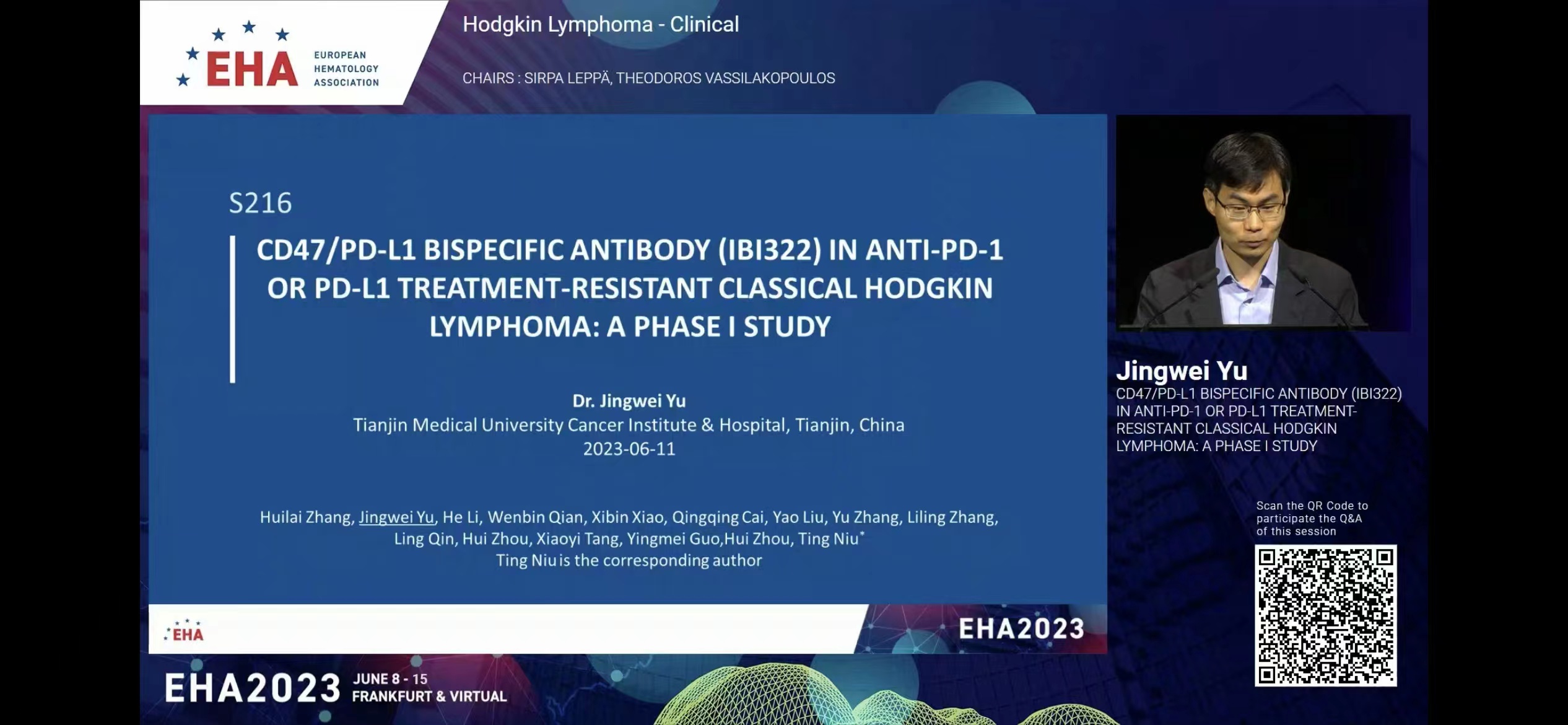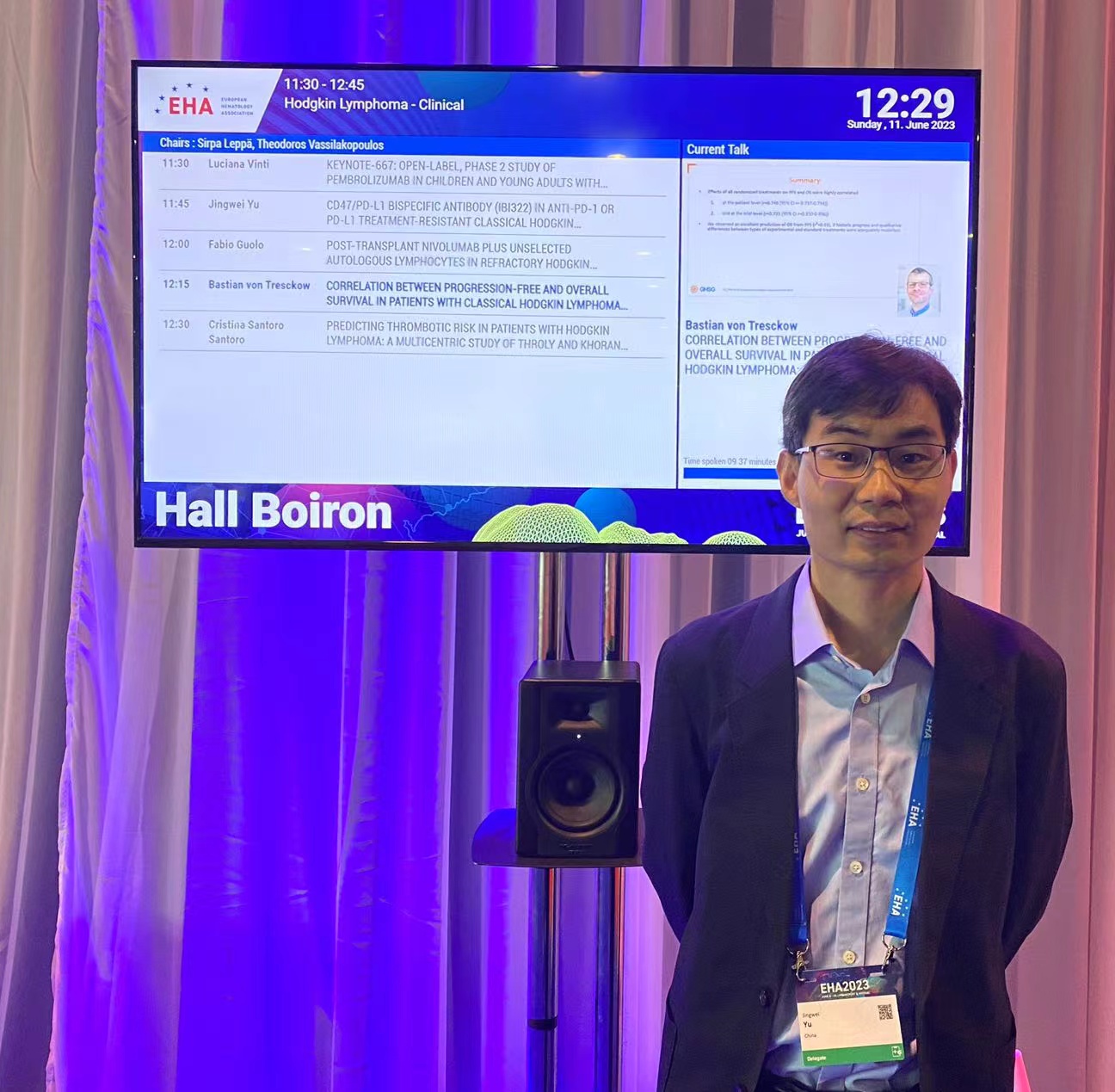International conference episode:Dr. Jingwei,Yu presented at the 28th European Hematology Congress, 2023
The 28th European Hematology Congress (EHA Congress) was held in Frankfurt, Germany, from June 8 to 11, 2023. The conference was hosted by the European Hematology Association (EHA). Dr. Jingwei,Yu, from Department of Lymphoma, Tianjin Medical University Cancer Institute &Hospital, was invited to deliver an oral presentation entitled CD47/PD-L1 BISPECIFIC ANTIBODY (IBI322) IN ANTI-PD-1 OR PD-L1 TREATMENT-RESISTANT CLASSICAL HODGKIN LYMPHOMA: A PHASE I STUDY. The abstract of the study as following:

Background:
IBI322 is an anti-CD47/PD-L1 bispecific antibody that blocks both the PD-1/PD-L1 and CD47/SIRP-α pathways. By an “imbalanced” design with a lower binding affinity to CD47 and higher binding affinity to PD-L1, preclinical models showed IBI322 tended to bind CD47+PD-L1+ tumor cells rather than CD47+ cells, which could significantly reduce the toxicity to red blood cells. Despite the excellent efficacy of PD-1 or PD-L1 inhibitors and brentuximab vedotin (BV) in relapsed or refractory classical HodgkinLymphoma (cHL), some patients (pts) still have disease progression. These pts have a poor prognosis and new treatment options are urgently needed.
Aims:
This phase I study is designed to evaluate the safety, tolerability and efficacy of IBI322 monotherapy in anti-PD-1 or PD-L1 treatment-resistant cHL pts.
Methods:
Eligible pts (18-75 years of age, ECOG PS 0-2) had histologically/cytologically confirmed cHL that was either primary resistant (best objective response was SD or PD after at least 2 doses) or secondary resistant (best objective response was CR, PR or SD and progressed or within 24 weeks of last dose) during anti-PD-1/PD-L1 treatment. Pts received IBI322 45mg/kg intravenously Q2W until unacceptable toxicity or documented disease progression, or for up to 24 months. The primary objectives of this study were to evaluate the safety and preliminary anti-tumor activity of IBI322 according to the Lugano 2014 criteria. Adverse events (AEs) were reported according to CTCAE v5.0.
Results:
Twenty-four cHL pts (median age: 35 years, range: 25-68 years; male: 17 (70.8%) pts; ECOG PS=0: 15 (62.5%) pts) who have failed anti-PD-1 or PD-L1 treatment were enrolled, 8 pts were primary resistant and 16 pts were secondary resistant. Among them, 4 pts progressed even after BV treatment. Among 23 cHL pts with at least one tumor assessment, the objective response rate (ORR) and disease control rate (DCR) were 47.8% (11/23; 95% CI: 26.8-69.4) and 91.3% (21/23; 95% CI: 72.0-98.9), respectively. For primary resistant pts, the ORR was as high as 57.1% (4/7; 95% CI: 18.4-90.1), and 3 pts achieved CR. For all 24 treated patients, treatment-related adverse events (TRAEs) of any grade occurred in 22 (91.7%) pts. The most frequent TRAEs (≥ 20%) were lymphocyte count decreased (n=15, 62.5%), anaemia (n=15, 62.5%), white blood cell count decreased (n=5, 20.8%) and platelet count decreased (n=5, 20.8%). Grade ≥3 TRAEs occurred in 10 (41.7%) pts, the most frequent grade ≥ 3 TRAEs (≥5%) was lymphocyte count decreased (n=7, 29.2%). Four (16.7%) pts experienced investigator-defined immunerelated AEs (irAEs). No grade ≥ 3 irAEs occurred. No pt experienced TRAE leading to drug discontinuation or death. As of data cut-off date, 12 pts remained on IBI322 monotherapy.
Summary/Conclusion:
IBI322 monotherapy showed a promising anti-tumor effectivity with a manageable safety profile in anti-PD-1 or PD-L1 treatment-resistant classical Hodgkin Lymphoma patients.
Clinical trial information: NCT04795128

European Hematology Congress is the annual meeting of European Hematology Association (EHA), as well as the grand academic conference in hematology science in the world. Dr. Jingwei Yu,on behalf of Tianjin Medical University Cancer Institute &Hospital,shared his team work with international colleague, and obtained insights from the experts who gathered in the conference. This is not only an opportunity to show off the research outcome of TMUCIH on hematology science, but also it spreads the Chinese voice on the global academic stage in hematology study.

